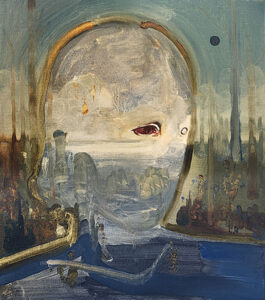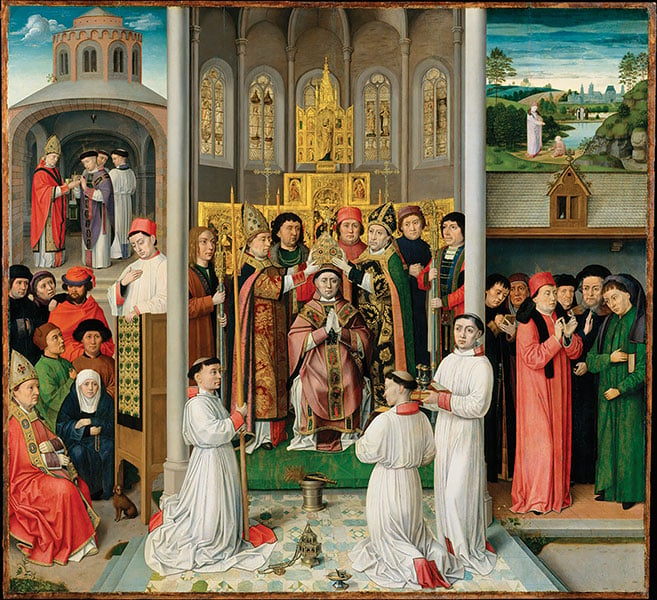
Human Lock, by Vojtěch Kovařík. Courtesy the artist and Mendes Wood DM, São Paolo, Brussels, New York City
The title of Jenny Erpenbeck’s new novel, Kairos (New Directions, $25.95), refers to the classical Greek concept of the opportune moment. The god Kairos “is supposed to have a lock of hair on his forehead, which is the only way of grasping hold of him,” Katharina, one of the novel’s two protagonists, reflects. “The back of his head is sleek and hairless, nowhere to grab hold of.” From her now-deceased lover Katharina has received boxes of papers and cassettes documenting the great love affair of her youth, and the novel’s catalytic kairos turns out to be Katharina’s first encounter, in the summer of 1986, with Hans, a writer thirty-four years her senior. They meet on an East Berlin bus in the rain, and their lives are transformed.
Beautifully translated by Michael Hofmann, the novel provides an intimate account of Katharina’s obsessive, transgressive passion: “Why a love that has to be kept secret can make a person so much happier than one that can be talked about.” But Erpenbeck also captures Hans’s perspective, in a third-person narrative that alternates between his point of view and Katharina’s. A husband and father in late middle age with numerous affairs behind him, Hans is aware from the start that “one day he will have to hand her on.” Katharina observes Hans with his wife and son from a distance:
Excitement, happiness, chagrin, fear, envy, doubt, curiosity, desire, pique, and yearning switch through her soul for an hour and a half.
Both believe—wrongly, alas!—that “our supply of bliss is something no one can take from us.”
Erpenbeck writes masterfully about time: days, weeks, and years stretch or collapse. Her remarkable novel from 2010, Visitation, relates the history of a country house on a lake in Brandenburg, spanning more than a century in less than two hundred pages. Here the intensities of the magnetic connection between Katharina and Hans are carefully recorded—from the early agony of a week’s separation to the more languorous rhythms of an established long-distance relationship, and thence into a jagged realm after trust is broken by infidelity. “Something begins, something ends—or it finds its fulfillment,” she writes. “But in the meantime, time pours into life, is braided into it, grows into it, entwines itself with it, but is never one thing.”
The arc of Kairos is that of Katharina and Hans’s ultimately doomed love, but it is also—how could it not be, written by Erpenbeck?—about the unraveling of the German Democratic Republic. “Will she and Hans be together in a year?” Katharina wonders at the beginning of 1990. “Will her country even still exist?” She’s aware that “what once was familiar is now in the process of disappearing.” In the future,
smooth flawless surfaces will render obsolete and forgotten everything that is ephemeral. The bread will taste different, the streets will be full of strangers walking past strange shops, with strange money in their pockets.
Their second kairos unfolds, and their difference in age takes on a new significance. Hans was born before the Second World War, and has variously been a member of the Hitler Youth, a disciple of Bertolt Brecht, a literary hero, and a radio voice of his generation. He is suddenly obsolete. Katharina was born in the Sixties and is just embarking on her adult life. She realizes that “he does not know her, nor she him.” Her father’s words come to mind: “Our personal tragedies, he is saying, are not those that move the world. Not even our defeats belong to us.”
Many years later she finds evidence that Hans long ago spied for the East German government under the code name Galileo, “as in the title of Brecht’s play.” It is Galileo, as Katharina notes, who “for the sake of the long-term truth strikes a few short-term compromises.” In life or in death, even in close relationships, we are never outside of history. Hans and Katharina are both passionately themselves and mere pawns in life’s great game, the one in which “Coca-Cola has succeeded, where Marxist philosophy has failed, at uniting the proletarians of all nations under its banner.”

In Blue, by Rae Klein. Courtesy the artist and Nicodim Gallery
The characters in Lorrie Moore’s compelling and surreal new novel I Am Homeless If This Is Not My Home (Knopf, $27), grapple similarly with the parameters of the self and history, life and death. Its protagonist, Finn, is a high school history teacher from the Midwest whose great love, Lily, has left him for another man. Early in the novel, Finn visits his dying brother in a New York City hospice center and the wild strangeness of the place challenges his sense not only of life’s injustice but also its implausible oddity. Summoned home by an urgent text, he abandons his brother in “the bardo” of hospice: “I need you to hang in there,” Finn tells him, “watch the [World] Series, I’ll be back.” On arriving home he learns that Lily has killed herself. Or “perhaps she hadn’t died,” he thinks. Perhaps “she had staged it somehow to escape. He would find her. She would know that.”
What ensues is Finn’s unforgettable road trip with Lily’s corpse. He retrieves her from the cemetery—“She seemed to have emerged from a mist that still swirled about her feet. . . . Crazed death had not yet made a stranger of her”—and sets her up in his passenger seat. She is dead but, to him, distinctly alive: because she is a ghost, or because “they were part of a quantum entanglement,” or because they were embroiled in a “strange late dusk dream, which was like a daydream but with more solidity, less light, and more doubt.” Eventually, they land on a “decrepit” inn on the Mason–Dixon line.
Here, out of time and perhaps out of life, they encounter an innkeeper named Elizabeth whose letters to her dead sister have been threaded like silver throughout the narrative. They constitute a journal, one that Finn finds in their room, “brittle, faded red . . . with a cracked spine and tawny, deckled pages.” In such places, “the afterlife overlays life,” Elizabeth, more than a century earlier, writes, “because people have difficulty choosing between them.” It’s easy to believe that, in this house, John Wilkes Booth lived incognito for a time. This is where Lily and Finn will spend their final hours together, before he must return to life, to New York, and to his brother, whose World Series has come to an end.
Moore is revered for her wit, and fans will not be disappointed by the novel’s dark humor. The prose might be her finest, whether in Elizabeth’s antique correspondence (“Yesterday I saw a large credulous sow trotting down the wheel-rutted road”) or in the depiction of Finn and Lily’s journey. Take the description of “the now starless sky” as “a charcoal foam,” or the comparison of Lily’s hair to “the nice grassy smell of a freshly killed stinkbug.” At a rest stop, “the soughing of her lungs matched the soughing of the car engine.” Finn and Lily, like Erpenbeck’s Hans and Katharina, prove to be trapped in time, with less agency than they might wish: “He and Lily were between and among the hours and days rather than in them.” Everything about this strange, beautiful, and terrible experience reinforces Finn’s belief that “time was a strange ocean through which we imagined we were swimming rather than understanding we were being randomly tossed.”

Scenes from the Life of St. Augustine of Hippo, a mixed-media painting (oil, gold, and silver on wood), by Master of St. Augustine c. 1490. Courtesy the Metropolitan Museum of Art, New York City
Time and human agency are likewise the remit of the historian Peter Brown. Rather than being storm-tossed by history, he has devoted his life to mastering it. A towering figure in the study of late antiquity, a founding father of the field, Brown has now, at close to ninety, written Journeys of the Mind: A Life in History (Princeton, $45), a seven-hundred-page memoir. For Brown, the project proves an antidote to, or refuge from, the roiling agon of our times. This meticulous and lively account of his intellectual development lovingly acknowledges all the scholars—from his school days onward—whose work helped shape his own. Written primarily for historians, it is also accessible and interesting to general readers such as Brown’s aunt Mai, who “had received a good high school education but had not continued to the university.”
Born in 1935 into an Irish Protestant family, Brown was educated in England, where he discovered classics and history. During a gap year before attending New College, Oxford, he learned German, thanks to which “a larger Europe was opened up” to him—the first of many such entrées for Brown, who has pushed indefatigably against traditional academic disciplines, broadening their scope and embracing interconnectedness. At Oxford, he read European history with an interest in Byzantium, an unpopular subject at the time. In his final year, he studied St. Augustine, eventually the focus of his marvelously engaging and still unsurpassed biography from 1967, Augustine of Hippo.
After finishing his degree, Brown won a fellowship at All Souls College, Oxford, that granted him seven years of “total freedom.” On deciding to enroll in a PhD program, he was assigned the great Italian historian of antiquity Arnaldo Momigliano as a supervisor. Momigliano would prove Brown’s “bridge to the wider world of European scholarship.” These years saw the publication of his Augustine biography, submitted in lieu of a thesis, and of his new conception of the late Roman empire, which challenged the long-held views established by Edward Gibbon in The History of the Decline and Fall of the Roman Empire (1776). He then turned his attention farther east, to relations between the Roman and Persian worlds, his work becoming “part of a general recentering of the field of late antiquity as a whole.”
In 1978, Brown moved to the University of California, Berkeley, and a decade later he published The Body and Society, his groundbreaking treatise on sexual renunciation in early Christianity. While the memoir ends at this point, he has published numerous books in the thirty-five years since, exploring, among other things, wealth and poverty and their consequences in late antiquity.
For academics, to read Brown’s memoir is to survey the first three decades of a field that he has almost come to represent. For the common reader, it is to discover a period little-known but full of vibrant, complex societies with many similarities to our own. For all readers, this book offers no less than a template for how to live, in an uncertain world, while surrounded by death and the unraveling of all we know: that is, in generous recognition of our teachers, with boundless curiosity, and buoyed by the delight of lifelong scholarship.






















































































